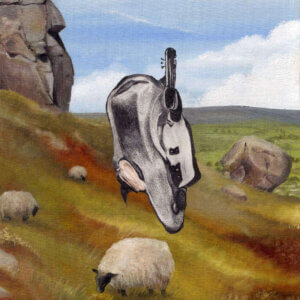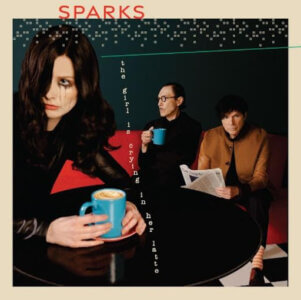
7
Silence is Loud
Nia Archives
In the eye of a junglist upheaval, jostled about, Nia Archives uses Silence is Loud to contemplate on the nausea of wrangling jungle music into the internet era. Despite the scale of this task, she does so with a zest of youthful restlessness. It invites nocturnal breakbeats into the daylight with radio-friendly tracks, maintaining deliberate and thoughtful lyricism while adhering to short-form pop format.
With nods to Britpop and invocations of 2000s alt-rock, it couldn’t be any more true to the modular spirit of jungle music, or its enduring role as a canvas for youth expression. It is more of a logical next step than a “revival” — as it captures coming of age in Black Britain, invoking the edgy lyrics of the pop-punk that dominated the airwaves during Archives’ childhood. Jungle music is not known for rock as source material (in an effort to maintain Black subcultural relevance), or making earnest efforts for mainstream attention. Nia Archives is taking the bold step, proving that the genre can keep its soul amidst the threat of commercial banalization. Long are the days when junglists sought the camouflage of steam-filled clubs.
Instead of embracing cynical anonymity, 24-year-old Dehaney Nia Lishahn Hunt explodes with distortion-laden vocals on the title track. Lyrically, she takes a step back, professing her loneliness: “without you, the silence is loud.” Contrasting bombastic jungle rhythms with the poise of indie rock lyrics, she takes caution by reminding us on “Crowded Roomz” that she feels “so lonely, especially in crowded rooms” and that “it’s a facade, my persona is my costume.” The skittering breakbeat is grounded by a slower, hypnotic vocal tune, reflecting that youthful malaise of “not fitting in,” or the difficulty in placing oneself amid the collective. More precisely, it felt like an exploration of the momentous task of tangling with the “scene.” There’s the literal deindividuation of the club scene, or the alienating effect of its excessive stimuli and clamor. Then there’s the invisible jungle music scene at large, plagued by all sorts of hierarchies. All the more afflictive for Black women, navigating the likelihood of withheld royalties. It sure is a mountainous task to maintain credibility while working doubly against a torrent of male chauvinism. Hunt has the taste and qualification to leave an indelible mark on the genre.
It is a fun and interesting fusion, one that requires credibility to not appear formulaic. With a proven affinity and deft hand in genre fusion, it illustrates a kaleidoscopic reach and appreciation. But if the lyrics were left alone, it would come off as not much more than cliché wailing. While the vocal performances can be a bit half-baked and droning, her commitment to a fine point in matters of production and encyclopedic fusion is reaffirming. The work-in-progress feel leaves room for promise, not confining her to one trajectory, while still demonstrating a credible ear for traditional jungle. What is left is a large promise and a massive, novel declaration in the iterative process of junglism.
The most affirming moment is on “Forbidden Feelingz” where she anchors her talent as a junglist — confessing to Apple Music that she was trying to say “I do this well and, if you want, you can go back and discover that stuff.” With faint echoes of ragga samples in the introduction, the catchy, patois-inflected lyrics go further to echoes Jamaican roots: “Forbidden Feelingz, ah wah ya deal with / Can’t face my feelings, need inner healing.” Even when showing off, it is with poise, infusing her music with a patience and respect that makes her a perfect candidate to be the genre’s modern face. And if you need more, her nan, auntie and four sisters still maintain a pirate radio-esque station in the pursuit of jungle preservation. With Jackson-esque afros, they were nicknamed The Bradford 5. Other then this ambitious, culturally informed, and reflective wave of “next-gen junglism,” perhaps more exciting is the newfound hope that, in the face of vacuous, commercialized iterations of jungle fusion, there are sincere devotees to the preservation of a genre thought lost to the commercial slog of the industry and its preference for virality (Tiktok’s insincere dilution in particular).
Junglists during the movement’s early years avoided any concession to the mainstream rave culture. Hiding from the spotlight and temptations of market appeal, they opted for unmediated, direct-to-audience distribution. Today, DJs are no longer the sole power brokers in artist success. And in the shadow of our new corporate tastemakers, a wide reach is required of artists. The responsibility of personal branding, marketing and the maintenance of an identity encumbers the artist, amidst other duties.
So, credit must be given where it is due. Where I stand as a U.S. listener, lacking the full context of musical history, I find the album unexciting but an endearing entry point for newcomers to the genre, while remaining wholly credible to the upturned noses of “old-school” junglists. For this, as well, it will stand as a unique generational timestamp on jungle music and a testament to the fact that its relevance is dependent on those unbound by tradition and willing to pay homage to an eclectic range of works.
Order Silence Is Loud by Nia Archives HERE
Latest Reviews
Tracks
Related Albums
Related News
Advertisement
Looking for something new to listen to?
Sign up to our all-new newsletter for top-notch reviews, news, videos and playlists.














